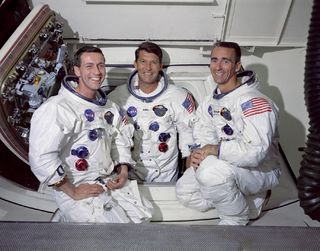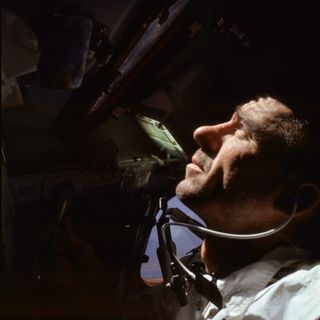Walter Cunningham: Apollo 7 astronaut
Walter Cunningham was a former NASA astronaut best remembered for flying the Apollo 7 mission in October 1968. He was the second American civilian to fly in space.
Cunningham was born on March 16, 1932, in Creston, Iowa. In 1951, at age 19, he enlisted in the U.S. Navy and began flight training the following year, according to his NASA biography. Cunningham flew 54 missions as a night fighter pilot during the Korean War.
In 1956, Cunningham joined the United States Marine Corps Reserve. For about three years in the early 1960s, he worked as a scientist at Rand Corp., a global policy nonprofit institution. During that time, he earned two degrees from the University of California at Los Angeles — a Bachelor of Arts and a Master of Arts, both with specialties in physics.
Related: Astronaut Walt Cunningham, who test-flew Apollo 7 command module, dies at 90
Then in 1963, Cunningham came to NASA as part of the agency's third astronaut class. He was initially assigned a spot on Apollo 2, but the mission was canceled following a launchpad fire that killed the Apollo 1 crew on Jan. 27, 1967. Parts of Apollo 2 were destroyed in the investigation to find out what happened to Apollo 1, Cunningham said in a 1999 interview with NASA. The agency decided to switch to a more advanced version of the Apollo spacecraft for all future missions.
"It was the dead-end mission, kind of, because it was the last one of this kind of a spacecraft," Cunningham said in his oral history of Apollo 2. "So, eventually NASA came to realize there's not much reason to fly this, and they cancelled Apollo ... part of it was to save money and to put the resources on to the [more advanced] Block 2 spacecraft."

Apollo 7 mission
NASA flew six uncrewed Apollo missions following the Apollo 1 incident, before continuing with the crewed missions. The entire Apollo 2 crew — Cunningham, Donn Eisele and commander Wally Schirra – were rescheduled to fly on Apollo 7.
Apollo 7 featured a command module with several key redesigns to address safety, including improved wiring, more fire-retardant materials and pumping a mix of oxygen-nitrogen in the capsule while it was sitting on the ground (an improvement over the pure oxygen that accelerated the fire in Apollo 1). The crew remained focused on their work preparing for the mission, Cunningham said in the NASA interview, even though the shadow of Apollo 1 loomed large over the program.
Apollo 7 flew in Earth orbit between Oct. 11 and Oct. 22, 1968. Overall, the mission was a success; the crew sent the first live television transmissions from space, they tested the service module propulsion engine and practiced for lunar docking using the discarded S-IVB rocket stage of the Saturn IB rocket that brought them into space, according to Cunningham's NASA biography. The Apollo 7 mission went so well that NASA gave the go-ahead for the crew of Apollo 8 to fly into lunar orbit, just two months later.
But in other respects, the Apollo 7 crew had difficulties. Schirra developed a cold in space and it's unclear if the other crewmembers developed colds as well. Nonetheless, there was obvious tension between the flight crew and the ground crew back at NASA. At one point, Schirra was frustrated enough that he canceled one of the crew's planned television broadcasts.
"There was some real bickering back and forth between Wally and the ground," Cunningham said in his interview with NASA. "I, frankly, have never felt like I had any kind of a problem with the ground, with going over the onboard tapes and air-to-ground and what have you."
But Cunningham said that his fellow crewmembers, Eisele and Schirra, made their disagreements with the ground crew's directions well known, especially Schirra.

Life after Apollo 7
For Chris Kraft, the mission control director, the most frustrating part of the Apollo 7 mission was when the astronauts refused to wear their helmets on the way back to Earth, as Kraft described in his memoir "Flight: My Life in Mission Control" (Dutton, 2001). The astronauts said they wanted to avoid having their eardrums pop due to congestion, but they also risked injury or death if the cabin suddenly depressurized.
The crew arrived safely back on Earth on Oct. 22, 1968. Kraft said he didn't want any of the crewmembers to fly in space again, and in fact, none of them did. In his interview with NASA, Cunningham said that he asked Kraft about saying that he'd stop the Apollo 7 crew from flying again, but Kraft denied ever making such a statement.
In any case, Cunningham was disappointed that he never flew again, he said. Cunningham was expecting to command the first Skylab space station mission, but that never came to pass. Instead, he became NASA's chief of the Skylab branch, responsible for operational inputs for the hardware, the launch vehicles and 56 major experiments.
Cunningham left NASA in 1971. In the decades following, he participated in several different business ventures, including commercial real estate, offshore engineering, project management and venture capital investments.
Cunningham is credited with starting a spaceflight tradition that continues today. He took the lead to have medallions struck for the Apollo 7 crew, which were flown on the mission and then engraved post-flight with the launch and landing dates. These mementos, now known as the Robbins medallions after the company that made them, have been made for every NASA crewed flight since.
In 1977, Cunningham authored "The All-American Boys," a "no-holds-barred" candid memoir that was widely praised for revealing the human side of the space program. In 1998, he was portrayed by actor Fredric Lehne in the HBO miniseries "From the Earth to the Moon."
In October 2018, at age 86, Cunningham took part in Apollo 7's 50th-anniversary celebration at the Frontiers of Flight Museum in Dallas.
"We thought, rightly or wrongly, that we [the Apollo 7 crew] could overcome all of the obstacles and that our goal was worth the risk," Cunningham said at the celebration, collectSPACE reported.
Cunningham died at the age of 90, on Jan. 3, 2023. His death was confirmed by his family.
"We would like to express our immense pride in the life that he lived, and our deep gratitude for the man that he was — a patriot, an explorer, pilot, astronaut, husband, brother and father. The world has lost another true hero, and we will miss him dearly," his family said in a statement released by NASA.
Join our Space Forums to keep talking space on the latest missions, night sky and more! And if you have a news tip, correction or comment, let us know at: community@space.com.
Get the Space.com Newsletter
Breaking space news, the latest updates on rocket launches, skywatching events and more!

Elizabeth Howell (she/her), Ph.D., is a staff writer in the spaceflight channel since 2022 covering diversity, education and gaming as well. She was contributing writer for Space.com for 10 years before joining full-time. Elizabeth's reporting includes multiple exclusives with the White House and Office of the Vice-President of the United States, an exclusive conversation with aspiring space tourist (and NSYNC bassist) Lance Bass, speaking several times with the International Space Station, witnessing five human spaceflight launches on two continents, flying parabolic, working inside a spacesuit, and participating in a simulated Mars mission. Her latest book, "Why Am I Taller?", is co-written with astronaut Dave Williams. Elizabeth holds a Ph.D. and M.Sc. in Space Studies from the University of North Dakota, a Bachelor of Journalism from Canada's Carleton University and a Bachelor of History from Canada's Athabasca University. Elizabeth is also a post-secondary instructor in communications and science at several institutions since 2015; her experience includes developing and teaching an astronomy course at Canada's Algonquin College (with Indigenous content as well) to more than 1,000 students since 2020. Elizabeth first got interested in space after watching the movie Apollo 13 in 1996, and still wants to be an astronaut someday. Mastodon: https://qoto.org/@howellspace
- Robert Z. PearlmancollectSPACE.com Editor, Space.com Contributor
